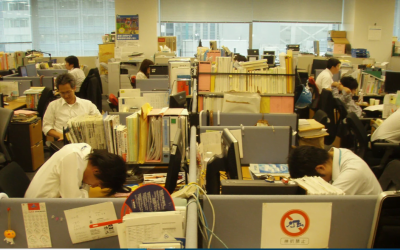
The Science Behind Stage Fright, and How You Can Overcome It
Some years ago, I was unfortunate enough to observe first-hand the phenomenon we all know as ‘choking’.
I had spent some months finding the perfect person to fill a position with one of the world’s most prestigious consulting firms. My company and I put together a shortlist of the most outstanding candidates, who subsequently went through a stringent interviewing process – that included seven rounds and a video conference with the global headquarters of the company – to whittle the group down to two. Both had exceptional academic and professional records, both had performed excellently throughout the interviewing process, but one of them I felt had stood out from the start.
This bilingual candidate had an MBA from a top American university, a glowing resume, confidence, good looks, an athletic build and honestly looked like he’d just walked off the cover of Fortune Magazine – he was the whole package.
The final interview was a 20-minute presentation on how to use advanced, strategic marketing techniques to launch a cardiovascular product in Japan. It should have been a walk in the park, and when I saw the first slide of what promised to be a perfect PowerPoint presentation – I thought it would be. Alas, what happened next, I’m sure will haunt him for years to come – he choked. Our rock-star was completely unable to articulate his thoughts, he was unable to answer questions coherently and there was absolutely no logical flow to the words coming out of his mouth. He knew it and we knew it. He laboured on, his increasing nervousness adding to the incoherence, before our client finally put him out of his misery, thanking him for his interest, but explaining he was not a ‘cultural fit’.
When I spoke to the candidate later, he was unable to explain what had happened. ‘My mind went blank’, ‘I’ve been working long hours’, ‘I was nervous’, all sounded like excuses he was making to himself, rather than to me. But we were both in agreement, one of the world’s most prestigious consultancy firms, would not want to hire someone who could not perform under pressure.
He was not the first person to choke when it mattered most, nor will he be the last. But why does it happen? What can we do to prevent it? And most importantly, can we recover from choking?
Choking has been defined by many experts, but basically it can be described as a decreased level of performance from your expectation, where there is an expectation for success or a high-pressure situation. And, the why? Once again there have been numerous theories offered up over the years – from stress, to thinking too much, to not thinking enough.
Sian Beilock, psychologist and President of Barnard College at the University of Columbia, has shown that those “who have the most ability to focus, the most working memory, the most fluid intelligence, are actually more prone to perform poorly under stress.” She has also shown that perceived stereotypes play a big role in choking too. For example, women asked to note their gender at the top of a math test, perform significantly worse, than those whose gender remained undisclosed. And perhaps counter-intuitively, a friendly environment might make you more likely to choke, than a hostile one. Other research done in India suggests that we are more likely to choke when performing cognitive tasks, rather than something creative or athletic, and in the same study, that large financial stakes, can mean even bigger mistakes.
Beilock describes choking as preventable results of information logjams in the brain, or paralysis by analysis. Something that happens when we over think something we would normally do naturally, and that makes you nervous. American Figure Skater, Jeremy Abbott – who believes he has choked twice, during two different Winter Olympics, describing his efforts as a “disastrous performance” – says he focused too much on NOT making a mistake, which took every insecurity he had ever had, about the possible mistakes he could make, and magnified them tenfold. It’s a terrible irony, that focusing on not making a mistake, can be the very thing that causes the most astronomical ones. Abbott never won his medal but has since devoted himself to helping others alter their focus and not makes the mistakes he made.
Anders Ericsson, Professor of Psychology at Florida University and the man who brought us the 10,000 hours concept and the notion of ‘deliberate practice’, has a different take on things however. When experimenting with golf putting, he asked his participants to describe out loud the process they were going through. His findings showed the more proficient, or ‘experts’, were able to give him a richer description than the novices included in the test, showing that a higher level of focus was important – or perhaps that choking, or the lack thereof, actually separates the experts, from the very, very good.
It’s horrible to think that our brains, normally so reliable for our day to day existence, can be working to sabotage us, depleting themselves of processing power and working memory, when it matters the most. But there is good news – there are plenty of ways we can prepare not to choke.
- Jot down your thoughts and worries
Get some perspective on all your worries and insecurities before crunch time. This will help you understand when you are worrying unnecessarily and when you can do something productive to negate your doubts.
- Practise, practise, practise
Become the expert, practise for any eventuality and become familiar with practising your craft in stressful situations. Use Ericsson’s deliberate practise, to inoculate yourself against choking.
- Focus on something else
Matthew Syed, the author of ‘Bounce’, gives examples of Olympic athletes focusing on the more important things in life before a big event – like family, their health, or just being grateful to be there. This again can give you a bit of perspective and significantly reduce your choking chances. There are many variations on this points, other suggestions from golf for example, recommend reducing your thought process into one key thought, that encompasses your stroke, rather than focusing on every tiny little detail. Or, focus on why you are going to succeed – you’ve practised, you’ve done this all before, there is no reason why on this occasion you should fail.
- Rethink how you’re feeling
Your racing heart, sweaty palms and dry mouth, aren’t signs of impending failure, they are symptoms of a body that is alert and ready to go.
- Meditation
The simple art of meditation boasts a plethora of good, even just practise for as little as ten minutes a day. Not only can it help you control and alleviate stress – but also decreases anxiety, improves cardiovascular health and helps you achieve a greater capacity for relaxation.
So maybe the age-old advice, counselling us to imagine the audience naked does have some bearing on preparing for high-stakes situations – although a room full of Pharma delegates naked, might be more likely to conjure feelings of fear, than of calm. Or another wackier suggestion, just choke. There’s a lot to be said for choking once, giving you the tools your need to NEVER choke again. Although it doesn’t seem true of Jeremy Abbott, I can confirm that our rock-star candidate hasn’t choked again to date and is very happy and successful in another, just as high powered, role.
In business, we must all take steps to recognize stress as the very real, very detrimental condition and prepare ourselves accordingly. If there is one thing research shows, it is that no one is immune to the effects of stress and it really can come out of nowhere, when you least expect it and when it matters most. Stress is the principle factor in the undermining of performance in the world of business, where competition for sales, high-stakes presentations and even bumping into your boss in an elevator, can all be occasions when choking can squander opportunities. But, stress, like worrying about making mistakes, begets stress, so at the end of the day, we’ve just got to let it go. Prepare for the next meeting, interview, presentation, day, to the best of your abilities – then forget it. The sun will still rise the next morning. If you make a mistake, own it, learn from it and come back stronger next time – we all make them, and in many cases, they are the making of us.
Jean Van de Velde was ranked 152nd in the world of golf in 1999, when he stood on the brink of being the first Frenchman in over 100 years to win any golfing championship, let alone the British Open. He had a three-stroke lead at the final tee – and he choked. Looking back on that moment now Van de Velde said, “It’s very easy to win with grace; it’s a lot harder to lose with it. And without patronizing anybody or blowing my own trumpet, I would say that, the way that I see life, and the way that I’ve accepted what happened, I believe that’s what people like.” And he’s right – nobody remembers who won the championship that year.
Recent Posts
- Top sporting coaches and business leaders have a lot in common
- Elevating Leadership: Insights from Japan’s healthcare sector
- How to be a country manager
- Here are four things your firm can do to attract and retain top talent in Japan’s pharmaceutical and medical device industry:
- Build a Strong Employer Brand – What can you do if your company stinks?


